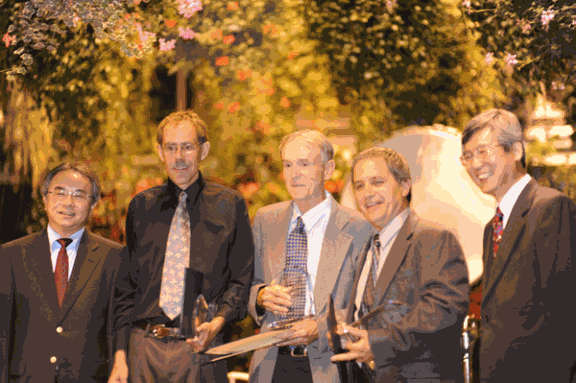Martin R. Kraimer, formerly of the Controls Group in the Argonne APS Engineering Support Division, is one of three recipients of the first Lifetime Achievement Award presented by the ICALEPCS International Scientific Advisory Committee. The award recognizes “those who through their vision, leadership and technical excellence have influenced the practice of control system development beyond the boundaries of their home laboratory or nation.”
Kraimer, Bob Dalesio (Bookhaven National Laboratory), and Jeffrey Hill (Los Alamos National Laboratory) were nominated for "the creation of EPICS and the EPICS Collaboration." EPICS is the Experimental Physics and Industrial Control System (https://epics.anl.gov/), a set of open-source software tools, libraries, and applications developed collaboratively and used worldwide to create distributed soft real-time control systems for scientific instruments such as a particle accelerators, telescopes, and other large scientific experiments. EPICS is used to control the electron accelerator and x-ray beamlines at the U.S. Department of Energy’s Advanced Photon Source (APS) at Argonne, where Kraimer worked before his retirement. EPICS was developed in a collaborative effort between the Argonne and Los Alamos national laboratories during the early stages of the design for the APS control system. The three recipients of the Lifetime Achievement Award were the primary technical contributors of the initial collaborative team.
The award to Kraimer, Dalesio, and Hill was presented during the International Conference on Accelerator and Large Experimental Physics Control Systems (http://www.icalepcs.org/, on October 12-16, 2009 in Kobe (Hyogo), Japan, the 12th in a biennial series of conferences inaugurated by a number of control system specialists from accelerator laboratories around the world.
According to the ICALEPCS Web site, “Since its beginning as a two-project collaboration in 1989, EPICS has become globally recognized as a capable, robust, and extensible control system infrastructure for a wide range of projects. It is used on hundreds of projects, including accelerators, tokomaks, telescopes and others, in over seventeen countries. Many commercial equipment vendors now advertise ‘EPICS drivers’ for their technical equipment.
“In addition to their technical achievement, these three have worked tirelessly to foster the spirit of collaboration that has been vital to the success of EPICS - removing technical and political barriers to collaboration, creating documentation, providing training and organizing collaboration meetings. With their vision, technical excellence and collaborative approach they have pioneered a new paradigm of global cooperation that has greatly influenced the international practice of control system development for large experimental physics projects.”
Kraimer is currently working on a project called JavaIOC, which promises much more flexibility for application developers by providing extensible records (the basic building block of an EPICS system) and supporting fully structured data types.
Note: (Hand-held) video of the awards ceremony and acceptance speeches is at

